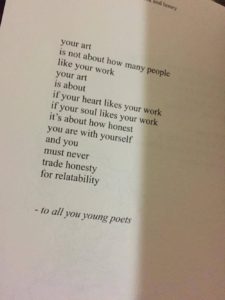I love Carolina’s question: what kind of poet do we want do be? For me, another way to word it would be “what do we want out poems to do, and what kind of relationship do we want to have with our poems?” Personally, anything I do must be honest and sincere. That is an expectation I hold for myself, because I have found that whenever I am not honest or produce something not out of honesty, it results in either guilt or disconnect between me and the product. Sometimes I don’t intend to be dishonest in my writing, but sometimes my writing is not skilled enough to or crafted in a way that represents my honest emotions and thoughts in their true meaning and depth.
Just as I finished typing that paragraph and checked my Facebook messages, I see this photo of a poem by Rupi Kaur that a close friend sent me:

How interesting….and timely…
And as I clicked onto the homepage of Facebook, I see this post from my dear friend Louis Marzella (Geneseo alumni) whom some of you might know:
*warning: midnight linguistic relativist rant ahead*
I truly believe that writing is an almost magical process and one of the most powerful things a person can do. When you are able to apply language to subconscious thoughts, feelings, and instincts, you not only come to more thoroughly understand those abstractions – you also arrive at totally new insights that conceptually may never have existed without language. I so often zip through life on autopilot without taking the time to reflect on my state of affairs, but I find that the times that I engage in deliberate verbal reflection – beyond passive, vague mental reflection – are the times I most consciously, clearly, and intimately know my self. If it’s your thing, I would encourage everyone to keep a journal or at least talk to yourself in the shower or the car. I really believe it can empower you in a concrete way and help you to see things differently.
I think Louis makes a great point. Writing is an act of self-discovery as is reflecting, except that it’s a concrete way of reflecting – there’s something about being able to see your thoughts visually and not just hearing them in your head. You realize things about yourself you wouldn’t have known if you didn’t write them down. You are able to step further away from yourself and look at yourself in a new light. Why we must know ourselves truthfully is another packed question, basically alluding to “is there an unchangeable truth ” and “what is the meaning of life”… Personally I don’t think any writing (or anything, actually) matters if there is no constant truth we can hold on to, if anything we do is permissible and if all boundaries are empty, meaningless or even harmful social constructs. But I digress.
If those are the two things that are most valuable about writing – the healing and the self-discovery – then I would say Kaur is right in his poem (although as Carolina has suggested, we cannot be sure whether those are Kaur’s true thoughts). Personally I think that is the kind of relationship I want with my writing – my writing serves as a mirror, sometimes a painting (this involves more manipulation and intention than the mirror), as therapy, and if none of those apply to me, that they would be those things to the reader. I’m fine with people relating to writing that I may not relate to or agree with anymore, but that piece of writing will probably lose value in my own eyes (unless the difference between what I write and who I am or think I am is so notable and telling of how I’ve changed).
So to summarize, what matters most in your writing (Amanda’s question) depends on what kind of poet you want to be (Carolina’s question). I value honesty in my writing since I have found that honest writing brings me the most healing, freedom from hurt/narrow-mindedness/shame/apathy, and joy, and so I want to be the kind of poet that either heals/frees/brings joy to me or the reader.

